#all简
Explore tagged Tumblr posts
Text
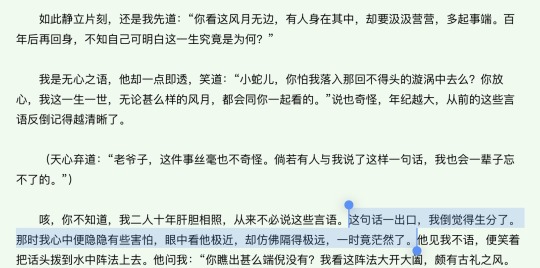





《我的一个朋友》 by 孔恰
#kongqia has the best prose of all the dnmei authors i’ve read so far imo#简明雅致又绵延 意犹未尽#以已垂暮之年的马小蛇的叙述来展开故事是个很妙的写法 从百十年后再回忆那些往事 感情就没那么撕心裂肺了 只是淡淡的怅然所失#于是读者们会如温水煮青蛙般地陷入平淡的讲述中 最后被虐得半死 尤其是结尾那段简直是神来之笔平地起雷 云淡风轻却句句锥心刻骨#explicitly or not it’s about three different unfulfilled loves: 马小蛇->丁若望->苏方宜->沈姿完 (who is dead long before the story even begins)#丁若望明知自己被算计被利用被当替身了 还��心甘情愿地给自己套上枷锁 一头扎进柔情蜜语编织的天罗地网中 往日的仗剑江湖快意恩仇再不复见#即当上武林盟主又做了朝廷大官不失为一番佳话的他至死还是对那位“沈郁”公子念念不忘#看似是苦苦一生求而不得 可他又说了那句“下一世 还要更糊涂 不让他算得那么辛苦” 或许也是求仁得仁吧#而马小蛇就更悲了 本该是主角却沦为旁观者#把一切都看得透透的却说不出走不了劝不动 只能眼睁睁看着自己心爱的人飞蛾扑火般地越陷越深 与他渐行渐远#悲就悲在当他开口讲这个故事的时候 丁若望和苏方宜的坟头上早已杂草丛生了#即便他有手段使人心不烂肉不腐 每到中秋还去他的坟前夜哭一回 人死万事休 再肝肠寸断的思念也只能永远烂在肚子里了#他从始至终没说过一个字 夜里拆招 大漠挡剑 走过长墙的时候都没说 这一辈子也不会说了#听完故事后的天心弃说他“没有一天开心快活” 可那十年与君浪迹天涯闯荡江湖又算什么呢?#又想当年春光那样好 两个笑得得意忘形的少年走过长廊 他静静望着那个可以管上六十年的笑容 加快了脚步#也许感情这件事只不过是甘不甘心 情不情愿罢了#all that to say it was very much my kind of story ^_^#r
1 note
·
View note
Text
on 妖 yao (and 慕声 Mu Sheng) in 永夜星河 Love Game in Eastern Fantasy (2024)
crossposted from a twitter thread!
there are SO many things i love about YYXH, but something i really appreciate is their portrayal of 妖 yao.


in ep. 10, Mu Sheng says, “人心有七窍,妖心只有一窍。所以大多数妖物的品行都简单执拗。” / "Human hearts have seven apertures [are complex and calculating]; but yao hearts have only one [are simple]. That's why the conduct of most yao creatures is uncomplicated and obstinate."
窍 / apertures (openings; orifices) are where the human body is connected to the outside world. as such, 七窍 seven orifices usually refers to the eyes (2), nose (2 nostrils), ears (2), and mouth (1). BUT...
in the context of the heart, it more often alludes to the virtuous character of 比干 Prince Bigan from the Ming dynasty novel 《封神演义》 Investiture of the Gods.
there, it was said that 圣人之心有七窍 / the hearts of saints [good men] have seven apertures...
...so, of course, the righteous and smart Bigan was rumored to possess a 七窍玲珑心 / lit. delicate seven aperture heart.
Bigan's story didn't end well (his heart was cut out by order of the infamous King Zhou of Shang), but 七窍玲珑 still means "clever and quick-witted."
now... 窍 can mean "opening"—but another way to say so could be 眼 / eye (or, "hole"). that is, we can draw a near-equivalency between 七窍玲珑心 / lit. seven-chambered heart and 多心眼 / lit. many heart's eyes; an overabundance of concern...
in particular, 多心眼 (or to say that someone 心眼多) not only implies wit and sharpness (i.e., "having a lot of thoughts"), but also some level of cunning and shrewdness. that is, to be "mindful of many things" means one is "considering of many things" and "calculating."
hence, returning to Mu Sheng's explanation: humans are crafty, always thinking of a hundred other variables and planning another hundred steps ahead. (that's why humans betray and deceive and hurt one another...)
but yao are simple.
yao don't have so many of these excess considerations. if they are hungry, they will seek to feed. if they are hurt, they will fight back. if they are scared, they will hide. if they are cared for, they will respond with equal gentleness.
in other words: yao are not human.
and this distinction is what made so many classic xianxias and yao-centric stories so compelling (think 白素贞 Bai Suzhen from the romance folktale 白蛇传 White Snake Legend).
to discuss our beloved 慕声 Mu Sheng as an example: it can be easy to say he has a jiejie-complex or is almost yandere-like about 慕瑶 Mu Yao, but we have to remember that as half-yao, he doesn't operate on the same frame of reference as humans. Mu Yao is the one person who has been consistently kind to him since he was young, and so he will reciprocate that kindness to (human standards of) extremity. likewise, when our cutie-pie 凌妙妙 Ling Miaomiao regards him with kindness, Mu Sheng will feel inclined to answer that with affections a hundred or a thousand times stronger.
though he grew up among humans, Mu Sheng's yao half should not be forgotten. humans may be fickle in their feelings; but yao (in general) will not be. once they have found someone worth their affections, they will love fiercely and to a terrifying degree. you can also understand it as yao not necessarily posessing the same understanding of 分寸 / "propriety" that humans do.
so, again, yao are not human—and that is why their stories have always been so compelling to us. we place limits on our conduct and behavior for a variety of socially-imposed and learned reasons, but yao as an imperfect reflection of our human selves allow us to live out our "fantasies" of extremity.
i think the new era of xianxias have largely traded that yao-human distinction for other things, like eye-catching CGI, flowy costumes, and the three lives, three worlds formula—which are, of course, not inherently bad.
YYXH itself is part of this new chapter of storytelling/the genre of xianxias after all (esp. given its existence as a 古偶), but that is ultimately precisely why it stands out so much to me.
is it the first or only xianxia in recent years to show that yao are nuanced? that yao are neither all good nor all bad? — of course not!
but i think it is undoubtedly among the very, very few in recent years that has successfully portrayed just what it is that makes yao so uniquely compelling. and that is due in large part to both strong writers (who also did 《苍兰诀》 Love Between Fairy and Devil) and strong actors.
in short, YYXH feels like a labor of love. love for the original 《黑莲花攻略手册》 novel; love for the xianxia genre; love for storytelling, in an era driven by capitalistic cash-grabs and the ruthlessness of c-ent.
the reality of that is up for debate, but as one individual viewer, i want to say that this drama has made me very happy. it is both respectful of and pays homage to the yao of classic xianxias.
and to be able to share and enjoy that cultural artefact—something that is so uniquely and immutably Chinese—with others, is something that brings me a lot of joy. ✨
192 notes
·
View notes
Text
I thought I would just finish creating these for every language as long as I had everything open.
DA: Veilguard 繁体���文 Traditional Chinese Script (Organized)
DA: Veilguard 繁体中文 Traditional Chinese Script (Raw)
DA: Veilguard 简体中文 Simplified Chinese Script (Organized)
DA: Veilguard 简体中文 Simplified Chinese Script (Raw)
DA: Veilguard 日本語 Japanese Script (Organized)
DA: Veilguard 日本語 Japanese Script (Raw)
DA: Veilguard 한국어 Korean Script (Organized)
DA: Veilguard 한국어 Korean Script (Raw)
DA: Veilguard Русский Russian Script (Organized)
DA: Veilguard Русский Russian Script (Raw)
DA: Veilguard Português Portuguese Script (Organized)
DA: Veilguard Português Portuguese Script (Raw)
DA: Veilguard Polski Polish Script (Organized)
DA: Veilguard Polski Polish Script (Raw)
DA: Veilguard Italiano Italian Script (Organized)
DA: Veilguard Italiano Italian Script (Raw)
DA: Veilguard Français French Script (Organized)
DA: Veilguard Français French Script (Raw)
DA: Veilguard Español Spanish Script (Organized)
DA: Veilguard Español Spanish Script (Raw)
DA: Veilguard Deutsch German Script (Organized)
DA: Veilguard Deutsch German Script (Raw)
DA: Veilguard English Script (Organized)
DA: Veilguard English Script (Raw)
BONUS:
Dragon Age: Inquisition Organized Script in French
French Dialogue Separated By Character
Everything Solas says in French
Comparison between Solas' dialogue in French and English
Thank you to @amburuthings for helping me get the Inquisition talktable in French!
(I would like to make organized scripts for Dragon Age: Inquisition in the other languages, but I need the raw talktable for them in order to process them, so if you would like to export the raw talktable in your language for me using Frosty and link me to it, I would be glad to quickly put it through my program.)
#Dragon Age#Inquisition#Veilguard#Inquisition spelunking#Veilguard spelunking#that comparing between Solas French and English lines.... I enjoyed looking at that even though I don't speak French#I don't speak any of these languages so these were automatically processed#the way this works is that the game files call them by English names and so I was not able to name them by anything other than in English#but the lines are what we want#forgive me if I wrote something wrong here lmao I really only speak English
115 notes
·
View notes
Text
Hello Cdrama fans! The signups for the Yuletide fic exchange close in a little over forty-eight hours, and there are a ton of Cdrama fandoms nominated. I'd LOVE to see some more Cdrama fans on board (and not just because almost all my nominations are that).
Yuletide is an annual fic exchange for rare and obscure fandoms run through the Archive of Our Own. Participants sign up to write a story of at least 1,000 words in a fandom someone else has requested, using the selected characters from that fandom. In return, they receive a story of at least 1,000 words in a fandom they have requested, featuring requested characters.
Please read this FAQ and the Rules before deciding whether to participate.
I had so much fun doing this last year (and I got some great Cdrama fic), so I wanted to share it here in hopes of bringing in some more participants from these fandoms.
The following Chinese/Taiwanese/Hong Kong Dramas are nominated:
HIStory3 - 圈套
S.C.I.谜案集 | S.C.I. Mystery
Thunderbolt Fantasy 東離劍遊紀
一念关山 | A Journey to Love
不良執念清除師 | Oh No! Here Comes Trouble
与凤行 | The Legend of Shen Li
且试天下 | Who Rules The World
九州缥缈录 | Novoland: Eagle Flag
云之羽 | My Journey to You
以家人之名 | Go Ahead
伪装者 | The Disguiser
你安全吗 | Are You Safe
你微笑时很美 | Falling Into Your Smile
你是我的荣耀 | You Are My Glory
侠探简不知 | Ancient Detective
全职高手 | The King's Avatar
冰雪谣 | Snowfall (TV 2024)
卿卿日常 | New Life Begins
南风知我意 | South Wind Knows My Mood
双夭记 | The Silent Criminal
原生之罪 | Original Sin
双镜 | Couple of Mirrors
后宫甄嬛传 | The Legend of Zhen Huan | Empresses in the Palace
君子盟 | A League of Nobleman
唐朝诡事录 | Strange Tales of Tang Dynasty
四方馆 | Go East
四海重明 | Love's Rebellion
回响 | Echo (TV 2023)
墨雨云间 | The Double
夜色倾心 | Night of Love with You
大唐女法医 | Miss Truth
天盛长歌 | The Rise of Phoenixes
女世子 | The Heiress
如懿传 | Ruyi's Royal Love in the Palace
宁安如梦 | Story of Kunning Palace
将军在上 | Oh My General
少年歌行 | The Blood of Youth (Live Action TV)
少年白马醉春风 | Dashing Youth (Live Action TV)
庆余年 | Joy of Life
延禧攻略 | Story of Yanxi Palace
很想很想你 | Love Me Love My Voice
御赐小仵作 | The Imperial Coroner
心宅猎人 | Psych-Hunter
恨君不似江楼月 | Killer and Healer
惜花芷 | Blossoms in Adversity
成化十四年 | The Sleuth of the Ming Dynasty
扫黑风暴 | Crime Crackdown
无眠之境 | Desire Catcher
星汉灿烂 | Love Like the Galaxy
有翡 | Legend of Fei
某某 | The On1y One
棋魂 | Hikaru no Go (Live Action TV)
沉香如屑 | Immortal Samsara
沙海 | Tomb of the Sea
法医秦明之幸存者 | Medical Examiner Dr. Qin: The Survivor
浮華夢 | Fu Hua Meng
涂山小红娘月红篇 | Fox Spirit Matchmaker: Red-Moon Pact
消失的痕迹 | The Evidence Tells
漂亮书生 | In A Class Of Her Own
猎狐 | Hunting
猎罪图鉴 | Under the Skin
玉骨遥 | Yù Gǔ Yáo
琉璃 | Love and Redemption
盗墓笔记2之怒海潜沙&秦岭神树 | The Lost Tomb 2: Explore with the Note
相逢时节 | Challenges at Midlife
种地吧 | Become A Farmer
绅探 | Detective L
美人为馅 | Memory Lost
老九门 | Old Nine Gates
老洞 | The Old Miao Myth (TV 1983)
致命游戏 | The Spirealm
花开有时颓靡无声 | Meet You at the Blossom
花轿喜事 | Wrong Carriage Right Groom (2023)
苍兰诀 | Love Between Fairy and Devil
莲花楼 | Mysterious Lotus Casebook
HIStory3 - 圈套
S.C.I.谜案集 | S.C.I. Mystery
Thunderbolt Fantasy 東離劍遊紀
一念关山 | A Journey to Love
不良執念清除師 | Oh No! Here Comes Trouble
与凤行 | The Legend of Shen Li
且试天下 | Who Rules The World
九州缥缈录 | Novoland: Eagle Flag
云之羽 | My Journey to You
以家人之名 | Go Ahead
伪装者 | The Disguiser
你安全吗 | Are You Safe
你微笑时很美 | Falling Into Your Smile
你是我的荣耀 | You Are My Glory
侠探简不知 | Ancient Detective
全职高手 | The King's Avatar
冰雪谣 | Snowfall (TV 2024)
卿卿日常 | New Life Begins
南风知我意 | South Wind Knows My Mood
双夭记 | The Silent Criminal
原生之罪 | Original Sin
双镜 | Couple of Mirrors
后宫甄嬛传 | The Legend of Zhen Huan | Empresses in the Palace
君子盟 | A League of Nobleman
唐朝诡事录 | Strange Tales of Tang Dynasty
四方馆 | Go East
四海重明 | Love's Rebellion
回响 | Echo (TV 2023)
墨雨云间 | The Double
夜色倾心 | Night of Love with You
大唐女法医 | Miss Truth
天盛长歌 | The Rise of Phoenixes
女世子 | The Heiress
如懿传 | Ruyi's Royal Love in the Palace
宁安如梦 | Story of Kunning Palace
将军在上 | Oh My General
少年歌行 | The Blood of Youth (Live Action TV)
少年白马醉春风 | Dashing Youth (Live Action TV)
庆余年 | Joy of Life
延禧攻略 | Story of Yanxi Palace
很想很想你 | Love Me Love My Voice
御赐小仵作 | The Imperial Coroner
心宅猎人 | Psych-Hunter
恨君不似江楼月 | Killer and Healer
惜花芷 | Blossoms in Adversity
成化十四年 | The Sleuth of the Ming Dynasty
扫黑风暴 | Crime Crackdown
无眠之境 | Desire Catcher
星汉灿烂 | Love Like the Galaxy
有翡 | Legend of Fei
某某 | The On1y One
棋魂 | Hikaru no Go (Live Action TV)
沉香如屑 | Immortal Samsara
沙海 | Tomb of the Sea
法医秦明之幸存者 | Medical Examiner Dr. Qin: The Survivor
浮華夢 | Fu Hua Meng
涂山小红娘月红篇 | Fox Spirit Matchmaker: Red-Moon Pact
消失的痕迹 | The Evidence Tells
漂亮书生 | In A Class Of Her Own
猎狐 | Hunting
猎罪图鉴 | Under the Skin
玉骨遥 | Yù Gǔ Yáo
琉璃 | Love and Redemption
盗墓笔记2之怒海潜沙&秦岭神树 | The Lost Tomb 2: Explore with the Note
相逢时节 | Challenges at Midlife
种地吧 | Become A Farmer
绅探 | Detective L
美人为馅 | Memory Lost
老九门 | Old Nine Gates
老洞 | The Old Miao Myth (TV 1983)
致命游戏 | The Spirealm
花轿喜事 | Wrong Carriage Right Groom (2023)
苍兰诀 | Love Between Fairy and Devil
莲花楼 | Mysterious Lotus Casebook
藏海花 | Adventure behind the Bronze Door
西出玉门 | Parallel World | West Out of Yumen
许你浮生若梦 | Xǔ Nǐ Fú Shēng Ruò Mèng | Granting You a Dreamlike Life
说英雄谁是英雄 | Heroes (2022)
还珠格格 | Huán Zhū Gé Gé | Princess Returning Pearl
追风者 | War of Faith
重启之极海听雷 | Reunion: The Sound of the Providence
长月烬明 | Till the End of the Moon
长歌行 | The Long Ballad
长相思 | Lost You Forever
长风渡 | Destined
關於未知的我們 | Unknown
问心 | The Heart
陪你到世界之巔 | Gank Your Heart
霹靂布袋戲 | Pili Glove Puppetry
风起洛阳 | Fēng Qǐ Luò Yáng
飞狐外传 | Side Story of Fox Volant
骄阳伴我 | Sunshine by My Side
鬓边不是海棠红 | Winter Begonia
鹿鼎記 | The Duke of Mount Deer (Hong Kong 1984)
I apologized if I missed any. I went fast so I could actually get this posted. For DONGHUA and MANHUA look under 'cartoons & comics & graphic novels'. For Chinese language movies look under 'movies'. For Cnovels (danmei and other), look under 'books and literature.' There are lots of nominations there as well. Here's the tag set!
By the way, according to Yuletide staff, the most frequently nominated fandom was Mysterious Lotus Casebook.
#cdramasource#cdrama#love between fairy and devil#mysterious lotus casebook#till the end of the moon#blood of youth#uhhh idk#lost you forever#meet you at the blossom#the double#just tagging some popular ones
108 notes
·
View notes
Text
5 common words my Chinese classes and textbooks didn't teach
Don't get me wrong, I enjoy learning with classes and textbooks. But no single resource or method can teach you the entire language! Here are 5 words (do particles count as words?) I see/hear all the time in native content that I never learned from classes or textbooks. Looking back, I'm surprised these weren't taught!
不仅 | 不僅 bùjǐn - not only (or 不仅仅 | 不僅僅 bùjǐnjǐn)
有这种看法的不仅是我一人。 他的病情不仅不见好转,反而更加严重了。
即 jí - namely / that is / i.e.
闽即福建省的简称。 元旦,即公历的1月1日,是世界多数国家通称的“新年”。
平时 | 平時 píngshí - ordinarily / in normal times
你平时都喜欢做什么? 他的打扮跟我平时遇到的人不大一样。
稍 shāo - somewhat / a little
请稍等。 说到这儿,他稍停了停。
呗 | 唄 bei - modal particle indicating lack of enthusiasm / modal particle indicating that things should only or can only be done a certain way
你不同意,那就算了呗。 既然不懂,你就好好学呗。
PS: I actually checked the textbooks I used in college to confirm that these weren't covered. But of course they could have been included in your textbooks.
Definitions are adapted from MDBG.
#my learning#chinese#mandarin#mandarin chinese#chinese language#studyblr#langblr#learning languages#language learning#chinese langblr#mandarin langblr#languageblr
285 notes
·
View notes
Note
Hi! If you don't mind me asking:
What does mxtx says about jc's character? Like some jc stans claim that she has said he has a knife tounge and tofu heart, (I don't believe it still) is it true? I don't know where to find her interviews, so I asked you instead:)
Thank you 💕
MXTX speaks on Jiang Cheng’s character in two places that I know: the old version of the postscript of the novel (absent from the official 7seas release) and an interview from before she left socials.
In the postscript, she only has this to say about Jiang Cheng:
Everyone should know what Jiang Cheng’s keyword is without me saying it. In the beginning, I thought with with XY’s [Xue Yang] existence, Jiang Cheng’s negative energy would definitely seem skimpy. Who knew he became the ultimate superstar of the comment section? Compared to him, XY was almost a poor, has-been idol. Only now and then would someone decide to drag him out again. Of course, in the end, under the combined PDA attacks of WWX and LWJ, the past and present superstars were obliterated.
And in this interview, she goes more in-depth. Sidenote: while I appreciate the interview for what it, I do not appreciate the ways in which they insert their own opinions about how they think MXTX should feel about Jiang Cheng into the actual interview commentary, and it shows how much of a bias even the interviewer had towards his character to have asked so many leading questions in an attempt to get a positive response out of her about him.
Anyways, here's some expansion by @jiangwanyinscatmom on the nuance of what mxtx meant by “not heinous/evil” that was lost in translation here and some more re-translation (still of the same interview as above):
墨香铜臭:本性不是特别坏,但是有人要讨厌他的话,那也没办法。因为你讨不讨厌一个人,也是……也是自己���问题。
He is not a 坏 (basically spoiled broken, corrupt) person by nature, but if someone wants to dislike him, there is nothing I can do about it. Because whether you dislike someone or not is also... your own choice.
MXTX's answer about why Jiang Cheng never could marry and how she sees him as a character (parenthesis section for jiangwanyinscatmom's own translation notes):
墨香铜臭:就性格比较差劲吧,谈了几个,吹了。 (He just has an 差劲 (average/lame/disappointing, let down) temperament, he dated several times but they were all failures) 墨香铜臭:我眼中的江澄……我眼中的江澄,就……其实没怎么样,我写文还是比较客观的。我看他……我看他就、就像是在看一个作品。 女主持:如果让大大本人来介绍江澄这个人的话,你会怎么介绍他? 墨香铜臭:我觉得他是一个负能量比较……重……的人。 女主持:这么简单吗? 墨香铜臭:对,负能量比较重,但是也不是个、也不是个十恶不赦的人吧。对。 MXTX: In my eyes, Jiang Cheng... In my eyes, Jiang Cheng is... Actually, it's nothing special. I am relatively objective when writing. When I look at him... When I look at him, it's like looking at a work of art. Female host: If you were to introduce Jiang Cheng, how would you introduce him? MXTX: I think he is a person with a lot of negative energy... Female host: Is it that simple? MXTX: Yes, he has a lot of negative energy, but he is not a heinous person. Yes.
In short: MXTX describes Jiang Cheng as a character that is filled with negativity and unable to date, but he is not inherently evil nor to the point of being irredeemable. He is a product of the story and fulfills the role he was created to fulfill in the plot. He's not a good person, not overtly and not secretly. That's it.
#mxtx asks#mdzs asks#anon#from what i'm understanding: the nuance of the 'evil/heinous' is#the difference between a schoolyard bully and cecil rhodes#yeah a schoolyard bully is a terrible person and their victims will likely never want to forgive them or befriend them in this life#but that is NOT AT ALL on the same level of what cecil rhodes did#interpersonal jackassery vs. societal-level crimes against humanity#(though i think the people of yunmeng would beg to differ about jc's crimes only happening on the 'interpersonal level' but i digress)#canon jiang cheng#jiang cheng
65 notes
·
View notes
Text
I wanted to say a few words. One of the Chinese TV awards is happening today. Of course, I hoped and wanted Yibo's films to receive all the recognition possible. Mainly because Wei Ruolai's role in War of Faith holds a special place in my heart. But even though the cdrama was shortlisted (out of 100), it is unlikely to win an award. None of the actors were nominated. Was I upset? Probably not, we all already experienced the shame of the Magnolia Awards, what can we expect from another one, lol. I just wanted to remind you about this cdrama, although it makes me sad to mention it now, but Yibo's role is still near and dear to me. I am very glad that Yibo has such a role in his resume. The playlist has all the episodes with subtitles, the episodes after the 27th one are after the video for sponsors - below.
43 notes
·
View notes
Text
i've found the source! (thank u roves.bsky.social) most of all images you've been seeing of bancalawalker have likely been coming from this video:
27 notes
·
View notes
Text
收下的香囊 Shōu Xià de Xiāng Náng
In ancient China, girls would give friends and love interests 香囊 (a sachet). If the love interest accepts, then he accepts to be her significant other. Proposal is a different case though, as it’ll be very costly for the man :)
Warning: Chinese is used (translation provided), not proofread, attempt on classification of things (i.e. a tree), a lot of culture drops, a few historical inaccuracies, anxiety (maybe near panic attack)
The story takes place in a Han dynasty-esque period (not really)
Dan Heng x gn! Reader (third pov)
Please read to the end for credits and explanations

A warm glow emitted through the paper window at the dead of night. There a figure sat, weaving a needle between the silk fabric. Silken thread of teal jade** wrap around the woven fabric, drawing out the form of a teal jade dragon flying between mountains and amongst clouds. When the figure was done embroidering the body, they finished off the stitch and swapped the thread out for one of pure gold. This has to be perfect.
The next day, the figure leaves their room, opting to head down to the pavilion overlooking the koi pond. Maids hurriedly followed suit, carrying whatever the figure desired. And when they made it to the pavilion at last, the figure wasted no time and sat down — beginning their work immediately. They pulled out their work, already been strung on the loom and began stitching again. A gentle pink thread weaved this time, shaping out peach blossoms. A soft breeze passes through, swaying the liusu tree** a bit a way. I don’t have much time left. The figure thought, I only have a three days before I depart for the capital. I’m sure he’ll be there.
The figure worked well into the afternoon until their friend had come along bringing snacks to feast upon. She brought something to work on too, as it was customary for the two to do so.
“你今儿怎么这么不安呢?你这个香囊不是做了很久了吗?这已经看的很完美了,为何还要再加呢?” [Why are you so restless today? Isn’t this the sachet you’ve been working on for so long? It already looks perfect, why do you still want to add more?]
“前面是完美的。但后面的必须得要跟前面一样完美。” [The front is perfect. But the back needs to be as perfect as the front.]
“这么拼命啊。是要送给谁啊?等等,让我猜猜!是不是。。。丹王子**?” [You really are giving it your all. Who are you going to gift it to? Wait, let me guess! Is it… Prince Dan (Heng)?]
The figure looked up at their friend in shock, having never told her despite working on the sachet for a while.
“三月。。。你是怎么。。。” [March… how did you…] The figure trailed off, their whole face starting to heat up.
“这不简单嘛。我上次来看你的时候,你绣的那个图案是个青龙。咱俩之间知道的青龙不是丹王子的话,那还会是谁啊?“ [It’s simple. The last time I came to see you, the pattern you embroidered was a teal dragon. If the teal dragon isn’t Prince Dan (Heng) as we know it, then who else could it be?]
The figure looked at the work in their hands and remained silent as March stared at them. A period of silence held between them until the figure spoke, “Do you think he’ll accept it?”
“I don’t see why he’ll reject it.”
The figure sighs, a thumb running over the even stitches softly.
“He’s so aloof. I don’t know if he likes me or tolerates me to not…”
“To not…?”
“To not ruin his image.”
Rustling was all the figure heard before a pair of hands enclosed around theirs. They look up to see March looking at them with a smile.
“It’s okay. You go along with what you planned, and if he breaks your heart, I’ll go beat him up. Princely title or not. No one’s allowed to hurt you.”
Reassurance began to settle in within the figure’s heart and a smile quickly followed.
“Thanks March.”

A day has since passed, the figure having finished their sachet before bed. The brass wind chime sang as they left their room, dressed thicker than usual. They still felt rather cold underneath layers, and the see-through silk did nothing to warm them. The figure tucked their hands in their sleeves while hurrying towards the carriage, the clicks of their muji** echoing through the courtyard. They nearly trip over themselves upon crossing the threshold as a gale races by. It’s times like these where the figure is thankful for choosing to apply beeswax** on their hair. A maid carefully helps the figure into the carriage, getting on after them. Right as they disappear behind the curtains, the carriage takes off for the capital.
Along the way, unease began to fester within the figure’s heart, unsure if Dan Heng will accept their sachet. They tried to calm themselves down, yet to no avail. When one worry is eased, another blooms. What if I’m too late and he’s already taken? The figure sighed.
“What’s wrong my liege?” The maid asked.
The figure shook their head and solemnly replied, “Nothing.”
The longer the ride became, the more nauseous the figure grew. Negative thoughts plagued their mind, many scenarios of them ending up heartbroken. Suddenly, the carriage feels more stuffy than usual. Yet at the same time, a cold feeling rushes down their body. As if reading their mind, the maid drew back the curtain for fresh air and comforted the figure.
“It’s okay my liege. His highness won’t reject you. I know it.”
“How?”
“Well it’s been quite the talk amongst us maids. Especially since your last meeting with him. We all saw how he looks at you.”
“What do you mean look at me? Isn’t he suppose to see?”
The maid giggled, “Not that kind. I mean yes, he is suppose to see. But I’m talking about those kinds. You know, the ones where a person yearns for the other?”
The figure is left confused. Never had they ever seen the look where one yearns for the other. Yet somehow, her words had left the figure feeling better.

The figure’s legs were weak by the time they descended the carriage. Their maid held an arm, helping and guiding them through the street as they sought out a familiar face. And soon enough, they found him standing right in front shop. Upon approaching him, the figure could tell he’s been focused on staring at the neatly shaped rice papers — trying to choose between the different quality of paper. With their right hand on top and left on bottom the figure bowed** — mustered up courage and spoke, “Greetings, Dan Heng.”
His gazed snapped from the paper and onto the figure. A miniscule smile is seen, as he does the same: Left on top, right on bottom.
“Greetings.” he paused, observing the figure. “Are you well?”
Their hand clutched the sachet tightly — trying to remain composed, “Yes,” a deep breath, “I have something to give you.”
Dan Heng’s eyebrows raised at this. Something to give him? Him, of all people? The figure pulls out the sachet from their sleeves and with both hands, hands it to Dan Heng. He looks at it for a brief period and with two hands, accepts the sachet. And upon having it in his possession, he unravels the strings then loops it through his silk belt. The figure watched with wide eyes as the butterflies dissipate, leaving behind only warmth. Dan Heng looks up to see the figure, now his beloved, standing there meekly.
“从认识你的时候,我一直都没见过这样的你。原本活泼的你现在变害羞了。哎呀,你怎么会这么可爱呢?” [Since meeting you, I have never seen you like this before. The lively person you were, have now turned shy. Oh, why are you so cute?] He softly teased.
Upon hearing his comment, his beloved’s face started flaring — resulting them to hide behind their sleeve as they averted their gaze. Dan Heng giggled as his hand rose to lower their arms and cup the side of the face. They looked up at him as he brushed his thumb across their cheek. His hand lowered only to take a hold onto their hand, intertwining it. With a gentled tug, he led her deeper into the market, leading the couple to spend the rest of the day wandering from stand to stand with fleeting affection.
When their gaze met Dan Heng’s, they understood what those around them were saying. Dan Heng isn’t one to display emotions freely, yet his actions speaks louder than words. And his eyes — his eyes will always be the first to say how he’s feeling.

We’ve all heard of method actors, and now get ready for method writers. No seriously though (TMI) I gave myself anxiety all because I was writing about MC getting anxious. What MC goes through is actually how my anxiety goes which is why I bring snacks or sour candy to hold down nausea. So I’m sorry that it sounds rushed. It doesn’t help that I bilingual too hard to the point that when even as I’m typing, my brain is just going “oonga boonga”. Anyways, here’s the cultural explanations and credits.
Teal jade is a literally a combo I made up. I’m under the assumption that Hoyo never truly confirmed if Dan Heng actually is 青龙。I know 青 translates to green, but in actuality, the green that is referred looks a little more blueish. Teal isn’t exactly it, but jade isn’t either. It’s very complicated to explain as it’s a color that isn’t really popular in the west. Think of the color this way, under certain lighting (and sometimes angle) the green will look more teal-ish. almost looking blue. Other times, it’ll have a more light jade color. I can’t remember the very ceramic style that uses this sort of “green”.
Liusu tree [流苏树] scientifically named Chionanthus retusus, is a tree with flowers that makes the tree look like it has lots of snow on it.
王子 means prince. Initially I had wanted to use 公子. But knowing how Xianzhou alliance had only allied with Vidyaharas, it only makes sense (in my brain at least) to have him be a prince. Not a king though, cuz that means they would have to meet and travel under different circumstances.
The use of muji 木屐 (commonly called ‘clogs’) can be dated as far back as pre Qin dynasty (Yellow emperor’s rule). It comes in many styles, very similar to how modern day slides look. Another style is one that is similar to geta. It remained popular until about the end of Song dynasty. Clogs are mostly worn in the south where there’s lots of rain and mud. Xishi is said of have worn clogs due to her insecurity of having big feet — so when she walked the skirt hid the clogs, but the clogs are still able to produce rhythms (think how catchy those rhythms must be).
Beeswax was used in ancient China as a way to hold back hair and to keep away fly-aways. Think of it as mousse or gel for ancient civilization.
Different dynasties had different ways of greeting each other. Though one thing remains roughly the same. Women (in this case feminine leaning) would have right hand on top, and left on bottom. Men are vice versa. The only time when it’s swapped are times like funerals. Although MC is gn, Dan Heng is masculine — thus to balance that out, MC would have to have a more feminine personality.
As for bowing, this depends on class. Kneeling or ketou 磕头 would not be done with (han-majority ethnic group) towards someone that aren’t parents. Of course, these are base rules as circumstances also apply — but it’s a good thing to note.
I wish I can attach links that I got these from, but I had obtained these info from the span of 2-3 years :’(. So if anyone finds these, feel free to link it so others who are interested can take a peak.
Divider Credits
All dividers used came from animatedglittergraphics-n-more
#hsr x reader#honkai star rail#honkai star rail x reader#dan heng x reader#hsr dan heng x reader#honkai star rail dan heng#hsr dan heng#dan heng x y/n#dan heng fluff#dan heng x you
71 notes
·
View notes
Text
The names of the Ruinous Quartet
So I’ve been playing Pokemon Violet and the names of the four Ruinous Pokemon are clearly derived from Chinese, so I thought I’d share some thoughts on what they mean.
The Ruinous Quartet comprise:
Wo-Chien
Chien-Pao
Ting-Lu
Chi-Yu
The first thing to note is that the names seem to use the Wade-Giles system of romanisation, as opposed to the Pinyin system used today. I don’t know Wade-Giles, so I’m going to be translating these to Pinyin for the explanations.
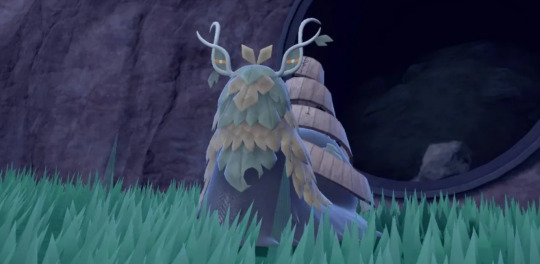
Wo-Chien
The Pinyin equivalent of Wo-Chien is Wo Jian. This doesn’t tell us what the tones are, but the Mandarin name for Wo-Chien according to Bulbapedia is 古简蜗 - Gǔjiǎnwō. 蜗 (Wō) means “snail” (more commonly said as 蜗牛 - wōniú). 简 (Jiǎn) is more difficult to translate because it can take on a lot of meanings depending on context and what words it’s paired up with (it can be a noun, adjective or verb), but in this context it refers to the strips of bamboo that were used for writing in Ancient China before paper was invented. These were strung together so they could be rolled up (kind of like sushi mats lol) when not being read:
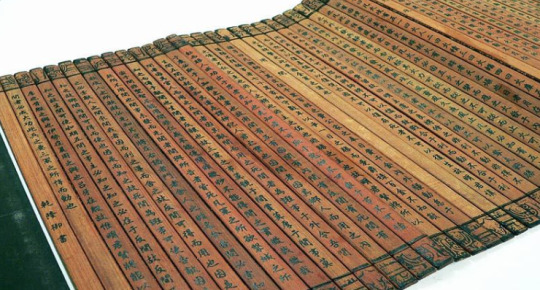
This is why Wo-Chien is the Tablets of Ruin. This version of 简 (Jiǎn) isn’t commonly used anymore, instead it’s more usually used to mean “simple” (简单 jiǎndān).
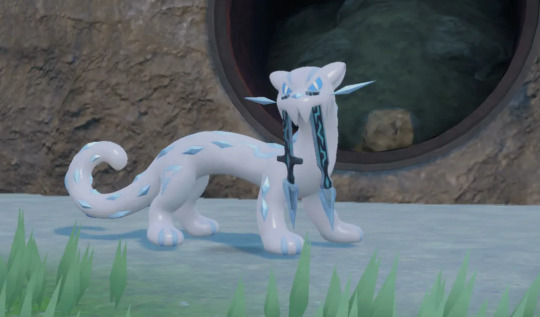
Chien-Pao
This one is fairly straight-forward. The Pinyin of Chien-Pao is Jian Bao. This “Jian” is a different word from the one above referring to the bamboo slips, which was 简 (Jiǎn) - this one is 剑 (Jiàn), meaning “sword”. And Bao here is 豹 (Bào), meaning “leopard” (not buns, which incidentally is 包 Bāo). Hence the Mandarin name for Chien-Pao is 古剑豹 (Gǔjiànbào), meaning ancient sword leopard. So Chien-Pao is literally Sword Leopard, which makes sense as it’s the Sword of Ruin.

Ting-Lu
Ting-Lu in Pinyin is Ding Lu, and the Mandarin name is 古鼎鹿 (Gǔdǐnglù). Lu here refers to 鹿 (Lù), meaning “deer”. Ding refers to 鼎 (Dǐng), which are ancient Chinese cauldrons with three legs and two handles (below). This is depicted on Ting-Lu’s head and is why it’s known as the Vessel of Ruin. So Ting-Lu is basically the Cauldron Deer.
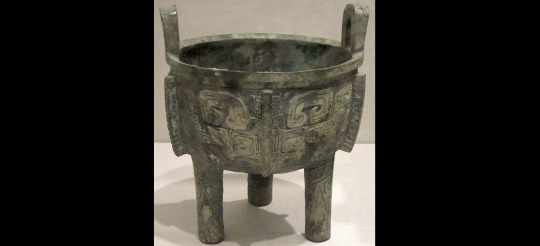
As a bonus, the character 鼎 (Dǐng) can be traced back to a hieroglyphical depiction of the actual cauldron itself (source):
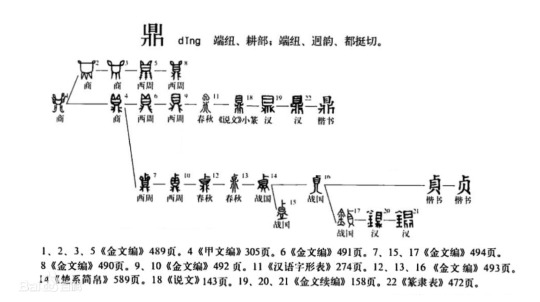
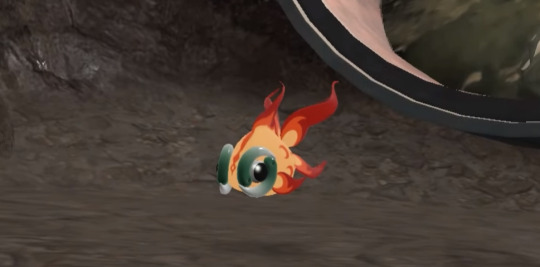
Chi-Yu
This one is a bit of a mystery. The Pinyin for Chi-Yu is Ji Yu. Now Yu is obviously 鱼 (Yú), meaning “fish”, but it’s unclear what character the Ji refers to. All three previous Pokemon’s names derive from the animal and their associated item (tablets, sword, cauldron). Chi-Yu’s associated item are beads, but that translates to 珠 (zhū), not “ji”. The Mandarin name for Chi-Yu is 古玉鱼 (Gǔyùyú), meaning ancient jade fish. This is another example of different Chinese characters being apparently spelt the same but said differently - 玉 yù vs 鱼 yú. Maybe this is why they didn’t go with Jade for the English, both because Yu can stand for both and Yu-yu would look somewhat silly.
One possibility (which is what Bulbapedia goes with) is that Ji Yu is 鲫鱼 (Jìyú), which is a type of carp (note also that Bulbapedia records it as goldfish, but goldfish is 金鱼 jīnyú).
Another (less likely but I think more interesting) possibility is that Chi-Yu isn’t Wade-Giles at all, but just Pinyin, in which case “Chi” could be 赤 (Chì), which is a fancy word for red (红 - hóng), kind of like how you can just have red but if it’s scarlet or crimson then all of a sudden it’s more exciting even though no one’s actually thinking about the precise shade differences. This would fit given Chi-Yu’s fire typing.
Aaaaanyway I hope this has been interesting and happy 2023!
#pokemon scarlet and violet#pokemon sv#pokemon#wo-chien#chien-pao#ting-lu#chi-yu#wo chien#chien pao#ting lu#chi yu#ruinous pokemon#treasures of ruin#x
727 notes
·
View notes
Photo

All rights reserved by 至简J
3K notes
·
View notes
Text

I just wanna post my process video I’m sorry for all-chinese website
21 notes
·
View notes
Text
Translation of a Bilibili Video Analysing the Paris Love Making Scene
HOLY SHIT THIS LITERALLY TOOK ME ALL DAMN DAY
Preface from me: PLEASE NOTE THAT THIS IS NOT MY ORIGINAL CONTENT! THIS IS JUST MY TRANSLATION OF THE FOLLOW VIDEO MADE BY 搭火箭都要追剧 A CHINESE RWRB FAN. I REPEAT, THE CONTENT IS NOT MINE, I'M JUST A TRANSLATOR (that being said I did a little bit of commentary, anything in brackets is my own thoughts)
All photos are unedited screenshots taken directly from the video
Preface from OP: The content of this video is very subjective and shallow, if it's different from your opinions, you're the right one (a Chinese saying which basically means "this is just my thoughts don't come at me") and it's most likely to be very different from any official BTS.
Didn't translate the first part because 1, I can't really translate it well due to cultural references 2, I... don't really agree with it, but did like 90% of the video
Also since it's about the Paris love-making scene, there's sexual content, you have been warned
For the moment when Alex slips his hand under Henry's shirt
When Alex slides his hand across Henry's naked waist, his fingertips, the most sensitive part of the hand is touching Henry's bare skin and stirring his desires, which is why Alex's body tenses: he clenches his jaw and takes a deep breath in.
In contrast, Henry is absorbed in the romance of it all. He's been in love with Alex the whole time and finally, the man of his dreams is here with him, touching him.
For the couple of shots where they stand naked with Henry touching Alex
1, Close Up Shot of Henry's hand gliding up Alex's arm
Henry told Alex that he's in good hands, therefore Henry's the one to lead this dance and set the atmosphere, so most of the light is on him, with the bright spot being shone on Henry's wrist which leads the audience to focus on that point
He starts with his fingertips running along Alex's vein, but the brightest spot doesn't follow the movement of his hand and stays focused on his wrist and the lower part of his thumb while the rest of his hand is in darker lighting. This is to strike a contrast and to put the focus on Henry's hand and therefore his movement. The reason only part of his hand is illuminated is because his entire hand is lit, the frame's lighting loses its balance and looks abnormal, and won't match the more subtle, softer tones of the romance in the movie
A highly saturated orange/golden light is chosen, which increases the feeling of content and ambiguity (I don't that sounds weird but it's the closest word I can think of, but a more accurate description… Imagine the use of steam in a shower sex scene) which also hints that this is going to be a lovely night
The use of light and the contrast of brightness on different parts also serve to convey Henry's emotions and internal thoughts. Even though their first night in Alex's room and their hook-up during the polo match were both really intense, but it was more about the surging, frantic sexual desire between the two. Now Henry doesn't actually know how Alex will react and is somewhat worried about it, which is represented by his fingers in darker lighting. But at the same time, Paris is the first time Henry can be so physically close with his long-time crush and be extremely honest/vulnerable with him, and later understand and feel each other on a spiritual level (… Woah.). He feels contentment from that, which is what the brighter area conveys.
In this single shot, the bright and dark areas are fairly equal, which also means these two emotions are in equal conflict at this moment
Then Henry's hand slides up towards Alex's shoulder and he switches to touching him with his fingertips, which, with its sensitivity, means Henry can feel any tiny change on Alex's skin. He feels Alex's excitement and comfort, which in turn makes him happy and bolder, which is also conveyed in the change of the light in the frame: the fingertips that were previously in dark lighting gradually shift into the brighter area, representing his worries fading
2, The following shot of Henry facing Alex's camera right, Alex's back against the audience, camera left
The light is still on Henry which means this shot is still conveying Henry's feelings
There's a clear contrast of light on his face which makes his face seem more 3D (again sorry for the weird translation but I can't find any other words) and attracts the audience's attention more.
The contrast is also represented in Henry's characterization. To explain this, we need to understand what a cognitive schema is: cognitive schema is a psychological concept which can be summarized as when a person is exposed to an object, event or person, they will use precious experience and knowledge to make a general judgment and description of them thus predicting their next actions. So in the case of Henry, at first since he's a prince, the audience and Alex, using their cognitive schema will assume he's prim and proper, when in reality he's horny (ha), flirtatious and adorable (so in conclusion, he's actually a babygirl)
Henry then lingers his hand on Alex, and glances at Alex with a flirtatious smile, enjoying Alex's shiver under his touch.
3, Shot of Alex facing audience camera left, Henry back against audience camera right
The light is now mostly on Henry's back, increasing the romantic atmosphere of the shot.
The light is also on Alex's torso and cheek forming a light contrast, which turns the audience's focus onto Alex. The larger dark area indicates he's being led by Henry in this situation, and he doesn't really know what Henry's gonna do, therefore his nervousness is the dominating emotion, represented by the dark area.
But he's also enjoying Henry's touches, which is why the light is still mostly on Henry but also partly on Alex now, almost like an extension of the contentment that Henry feels
The lamp that in-universe is providing the lighting is on the right side of the frame. If a similar light source isn't placed on the left side, the left side of the frame would seem too cold, which would destroy the atmosphere previously created. Therefore a mirror was placed there both for spatial balance and to create a reflection of the lamp's light, creating a small light spot on the left, balancing the coloring and lighting of the shot.
To the right of the mirror where the light can't cover is a small cupid statue. The statue not only adds to the romantic atmosphere but also indicates what's about to happen, as cupid symbolizes love and sex. Cupid is also a mischievous God who enjoys pranks, which also somewhat describe the boys' relationship: cupid shoots out the silver/lead arrow of aversion and revulsion that leads to their misunderstanding and subsequent hatred, but the shoots out the golden arrow of fall that led to them falling in love with each other and living together happily ever after.
Alex keeps watching Henry's hand as his hand slides down and looks back up when Henry touches his chest and takes a deep breath. Henry smiles brightly at Alex's reaction.
Alex then becomes intoxicated by Henry's touch as his sexual desires take over him
When Henry picks up the key that means a lot to Alex, Alex clenches his jaw. The highlight in his eyes allows the audience to immediately catch the change in his eyes that's filled up with lust.
So to conclude this part, a lot of attention was given to the placement of props and the lighting: the saturated golden creates a romantic but steamy/foggy (meraki seriously can't find the right word) setting, which is a filmmaking technique often used by Wong Kar Wai, in fact a similar lighting was used in "In the Mood for Love" (Matthew is a true fan)
For the shots of them kissing on the bed
There's a red mark on Henry's chest which OP explained in an earlier video that would have been caused by Alex grabbing there when thrusting forward
There's another possibility which is Alex getting excited when being behind Henry but he doesn't really know what to do so all he can do is grind against Henry. But Henry feels and sounds divine, and Alex gets impatient so he leaves marks on Henry's arm and chest
To prove her hypothesis op did an experiment with her own arm: she chose her arm because just like the part of Henry's chest that's marked, part of the muscle curves (into the elbow just as the chest muscle curves into the armpit) it's not a easy place for fingers to exert force, thus can draw a closer, more subjective comparison.
Experiment process: open uses her other hand to grab onto her arm and pull backwards forcefully, to 1, observe the shape of the mark and if it's identical to that of Henry's, 2, observe the time needed to create the mark in order to be the same as Henry's
As shown in the photo, the (faint) red marks are approximately the same shape, width and redness as the ones on Henry's chest. It took 28 seconds to reach this. This approximates the time taken by Alex to "do stuff" (I think she means prep?) from Henry's behind
With how loving and gentle Alex is with Henry it's not that likely that he started groping Henry's chest from the beginning, so the conclusion is when Alex was trying to "move forward" when he was behind Henry (I seriously don't know if she means prep or like, doggy style) but doesn't really know what to do and groped Henry in his nervousness, and this failed attempt lasted at least 28 seconds.
OP thinks the failed attempt was done in front of the window with Henry bending over, gripping the back of one of the chairs, and deduced from the DNC scene: the boys were originally chatting in bath robes on the couch with the curtain mostly closed, but when Zahra barged in, the blackout curtain was out, leaving just the mesh layer closed. There was a bathrobe on the far side of the couch and another in front of the window. So presumably after the talk, they went for another round, Henry ditched his robe on one side of the couch and pounced on Alex (similarly to how he did on Alex's couch), they tumbled around and switched position and ended up in front of the window, Alex remembered he failed attempt in Paris and wanted to make up for it so he pulled open the blackout curtain but left the mesh layer closed, and then he got to work. (...tbn personally I think this is a stretch?)
Henry thinks Alex is adorable but he's also really intoxicated and wants to get down to business asap, so he grabs Alex's neck and presses Alex towards him, kissing from Alex's lips to his neck. He kissed Alex's neck because from their first hook-up and the way Alex immediately stretched his neck to give Henry space when he kissed his neck then, that this is the quickest way to stimulate him. Which is why you can see a faint hickey on Alex's neck
As they kiss they walk towards the bed. During their first hook-up, Henry pushed Alex onto the couch, so now it's Alex's turn to pounce on Henry, which is what we see in the shot: Henry falls onto the bed first, then Alex follows. Alex is really happy and a bit proud that he can drive Henry crazy like this, while (and I quote directly) Henry can't think of anything anymore, and has "please hurry up and fuck me" painted on his face
The mark/hickey on Alex's neck takes the shape of an inverted triangle, with the vertical side and the diagonal side (left down right up, in math it's a positive slope) being more red, which means those two points experienced the largest amount of force
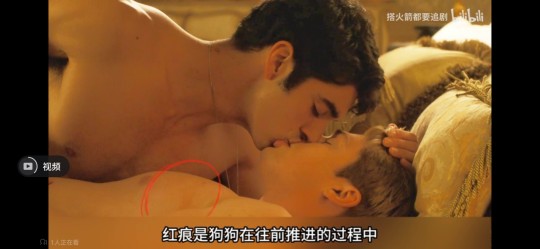
Red Mark on Henry's Chest
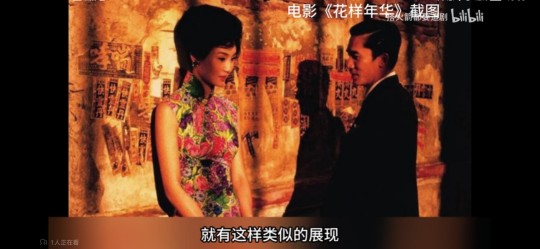
Screenshot from In the Mood for Love using a similar lighting
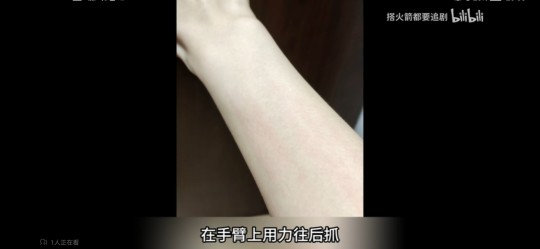
Red Mark Result from OP's experiment
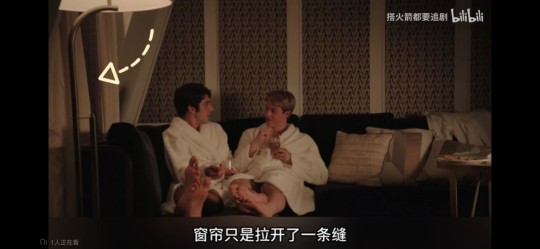
Blackout Curtain Closed on DNC Night

Bathrobe (presumed to be Henry's) on the far side of the couch
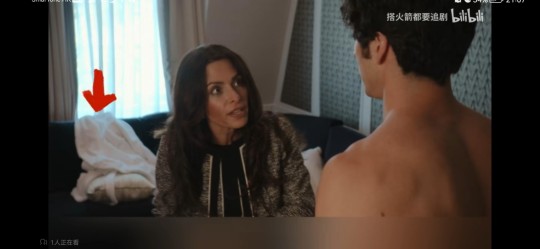
Bathrobe (presumed to be Alex's) near the window, Blackout Curtain Open in the background
For the process, deduced with the shot of them laying in bed during the afterglow
The trajectory of sweat on Henry's temple runs downward vertically. If he was fucked lying down, the sweat should run into his ear canal horizontally. Which means he was fucked in a sitting position. For example in the polo match hookup, Henry's sweat is visible in the form of drops running vertically down his face. Also in the afterglow, the sweat also seems to be splattered, which required Henry to have vigorously moved either up and down or front and back. So yeah this further proves that there was a cut riding scene.
Alex also has sweat on his face, and his fringe is wet. So riding should have happened right before they lied down and started talking.
So the process deduced by OP is 1, they tried doggy style in front of the window and failed 2, what was shown in the movie 3, doggy style on the bed 4, riding (OP wasn't aware of the details of the extended Paris love-making scene, but all RWRB fans in China know that there's doggy style and riding that got cut, this is OP's deduction of the order)
Even without looking at the sweats and marks, from the way Henry's signet ring is turned in the movie you can tell that something's deleted, since before Alex intertwined his fingers with Henry, the letter H was facing outwards, and when their hands join the movement causes the ring to turn and for the letter to face inwards. But then the next shot with Henry's hand on Alex's shoulder shows the ring worn normally again, which means something in between was deleted or reordered.
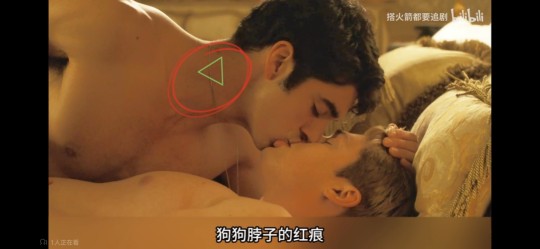
Hickey on Alex's Neck
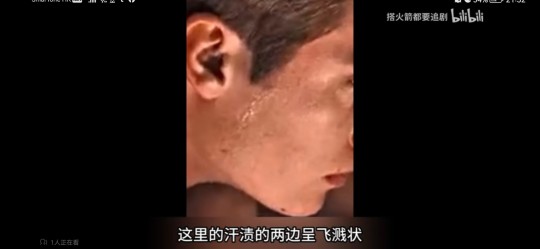
Henry's sweat in the afterglow
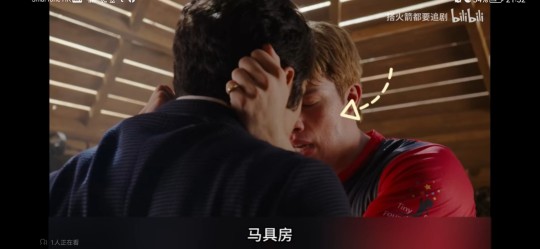
Henry's sweat during the polo hook-up
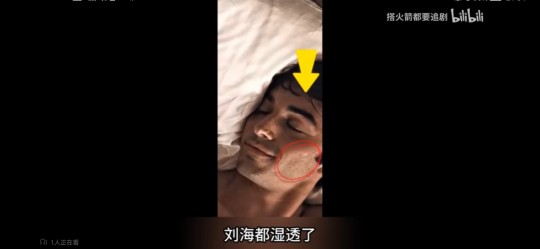
Alex's sweat in the afterglow
tagging @sanneannelies7 and @na-18dia who mentioned wanting the translation in my original post
#rwrb#red white and royal blue#rwrb movie#alex claremont diaz#henry fox mountchristen windsor#henry hanover stuart fox#firstprince#taylor zakhar perez#nicholas galitzine#rwrb thoughts#rwrb analysis#rwrb meta#I'M EXHAUSTED I LITERALLY SPENT THE WHOLE DAY DOING THIS#which is fine because i spent the day waiting for my dad in the hospital with nothing but my phone and ear buds (he's fine it's a check up)#but still this took a lot outta me#i do think some of this is overthinking but it's fun#also begs the question#the marks are there that's undeniable but for Taylor and Nick how did they get them there#anyways#translating is fun and I do like doing it#this was just really fucking long#the video's 25 minutes#please appreciate my dedication to RWRB this is the hardest post i've ever made#meraki translates
59 notes
·
View notes
Audio
《万物可爱》 performed by Yibo (transl.©)
我的手 习惯摸摸我的头 My hands are used to touching my head 就打开 记忆的河流 Just like opening a river of memories 池塘边 总有几个好朋友 There are always some good friends by the pond 听蝉鸣 看渔舟 Listening to the cicadas, watching the fishing boat
人和人 如何区别儿零后 Between people, how do you differentiate 是年幼 或是很成熟 Are they young or old? 淤泥下 终于长出了莲藕 Under the soil, finally does the lotus grow 请莲花 莫回首 May the lotus never turn back
我爱初春 也会爱深秋 I love the start of spring and also late autumn 我爱青丝 也会爱白头 I love black hair and will love white hair 我爱漂泊的人回到家门口 I love how the wandering return back to the doors of their home 人生简单就足够 It’s enough for life to be simple
我爱新鲜 也会爱陈旧 I love new things and also the past 我爱梦醒 也会爱梦游 I love being awake and also walking among dreams 我爱重逢的人紧紧不撒手 I love those who reunite and never let go 我爱昙花一现的所有 I love everything short-lived
人和人 如何区别几零后 Between people, how do you differentiate 是年幼或是很成熟 Are they young or old? 淤泥下 终于长出了莲藕 Under the soil, finally does the lotus grow 请莲花 莫回首 May the lotus never turn back
我爱初春 也会爱深秋 I love the start of spring and also late autumn 我爱青丝 也会爱白头 I love black hair and will love white hair 我爱漂泊的人回到家门口 I love how the wandering return back to the doors of their home 人生简单就足够 It’s enough for life to be simple
我爱新鲜 也会爱陈旧 I love new things and also the past 我爱梦醒 也会爱梦游 I love being awake and also walking among dreams 我爱重逢的人紧紧不撒手 I love those who reunite and never let go 我爱曾经失去的所有 I love all that I lost
55 notes
·
View notes
Text
Yuletide assignments have gone out, and that means all the prompts are now public (ao3 link). If you're me, you just enjoy reading people's prompts and letters, but also, it's a chance to see what people are longing for so you can give treats. Treats are 'extra' fics beyond the normal Yuletide assignment. Anyone can give them even if they didn't sign up for the actual exchange (although unfortunately you won't get a fic in return). Note that there also options for artists to provide treats. I'm definitely eyeing some prompts to see what I might be able to do on that front if I have the time. 👀
Here are the Chinese language dramas that have prompts available, with the amount of requests listed next to them:
HIStory3 - 圈套 | HIStory3: Trapped (2)
一念关山 | A Journey to Love (4)
不良執念清除師 | Oh No! Here Comes Trouble (3)
与凤行 | The Legend of Shen Li (2)
且试天下 | Who Rules The World (1)
九州缥缈录 | Novoland: Eagle Flag (1)
云之羽 | My Journey to You (4)
以家人之名 | Go Ahead (1)
伪装者 | The Disguiser (3)
你安全吗 | Are You Safe (1)
你微笑时很美 | Falling Into Your Smile (1)
你是我的荣耀 | You Are My Glory (1)
侠探简不知 | Ancient Detective (3)
偷偷藏不住 | Hidden Love (1)
冰雪谣 | Snowfall (2)
卿卿日常 | New Life Begins (3)
双镜 | Couple of Mirrors (1)
后宫甄嬛传 | The Legend of Zhen Huan | Empresses in the Palace (1)
君子盟 | A League of Nobleman (3)
四方馆 | Go East (2)
回响 | Echo (1)
墨雨云间 | The Double (6)
夜色倾心 | Night of Love with You (1)
女世子 | The Heiress (1)
如懿传 | Ruyi's Royal Love in the Palace (1)
宁安如梦 | Story of Kunning Palace (4)
将军在上 | Oh My General (2)
少年歌行 | The Blood of Youth (Live Action TV) (6)
少年白马醉春风 | Dashing Youth (Live Action TV) (2)
庆余年 | Joy of Life (7)
延禧攻略 | Story of Yanxi Palace (2)
很想很想你 | Love Me Love My Voice (1)
御赐小仵作 | The Imperial Coroner (2)
恨君不似江楼月 | Killer and Healer (1)
成化十四年 | The Sleuth of the Ming Dynasty (7)
星汉灿烂 | Love Like the Galaxy (4)
有翡 | Legend of Fei (1)
棋魂 | Hikaru no Go (Live Action TV) (3)
沙海 | Tomb of the Sea (4)
涂山小红娘月红篇 | Fox Spirit Matchmaker: Red-Moon Pact (1)
消失的痕迹 | The Evidence Tells (1)
猎狐 | Hunting (1)
猎罪图鉴 | Under the Skin (5)
玉骨遥 | Yù Gǔ Yáo (1)
琉璃 | Love and Redemption (2)
种地吧 | Become A Farmer (1)
绅探 | Detective L (3)
老九门 | Old Nine Gates (3)
老洞 | The Old Miao Myth (1)
致命游戏 | The Spirealm (4)
花开有时颓靡无声 | Meet You at the Blossom (12)
苍兰诀 | Love Between Fairy and Devil (6)
莲花楼 | Mysterious Lotus Casebook (22????!!)
藏海花 | Adventure behind the Bronze Door (1)
西出玉门 | Parallel World | West Out of Yumen (3)
说英雄谁是英雄 | Heroes (3)
还珠格格 | Huán Zhū Gé Gé | Princess Returning Pearl (1)
这!就是街舞 | Street Dance of China (2)
追风者 | War of Faith (4)
长月烬明 | Till the End of the Moon (3)
长歌行 | The Long Ballad (1)
长相思 | Lost You Forever (5)
關於未知的我們 | Unknown (2)
陪你到世界之巔 | Gank Your Heart (1)
霹靂布袋戲 | Pili Glove Puppetry (2)
风起洛阳 | Fēng Qǐ Luò Yáng (2)
骄阳伴我 | Sunshine by My Side (1)
鬓边不是海棠红 | Winter Begonia (2)
鹿鼎記 | The Duke of Mount Deer (1)
琴師 - 音頻怪物 | A Stringed Instrument Player - Yīnpín Guàiwu (Music Video) (1)
Have fun!
#cdrama blogging#love between fairy and devil#mysterious lotus casebook#meet you at the blossom#lost you forever#under the skin#blood of youth#the double#joy of life#the sleuth of ming dynasty#that's all the fandoms with five or more#cdrama
33 notes
·
View notes
Text
Tricky words that differ between 普通话 and 国语
Usually tone and other small pronunciation differences between 普通话 and 国语 don’t phase me much. In context I don’t even notice 期望 qīwàng vs. qíwàng. But recently I stumbled across 颤巍巍 and realized that it’s a lot harder when both/all syllables in a word are pronounced differently!
Here are 8 words (including 颤巍巍) that sound pretty different in 普通话 and 国语 (definitely not exhaustive).
Format: 简体(繁体)普通话读音 | 国语读音 Simp. (Trad.) Putonghua pron. | Guoyu pron.
【1】 颤巍巍(顫巍巍)chànwēiwēi | zhànwéiwéi - trembling / swaying / flickering / tottering / faltering
【2】 血液* xuèyè | xiěyì - blood
【3】 差劲(差勁)chàjìn | chājìng - bad / no good / below average / disappointing
【4】 熟识(熟識)shúshi or shúshí | shóushì- to be well acquainted with / to know well
【5】 血迹*(血跡)xuèjì | xiějī - bloodstain
【6】 垃圾 lājī | lèsè - trash / refuse / garbage / of poor quality (this is probably the most well known difference!)
【7】 倏地 shūde | shùdì - swiftly / suddenly
【8】 惋惜 wǎnxī | wànxí - to regret / to feel that it is a great pity / to feel sorry for sb
Definitions are from MDBG.
*The pronunciation of 血 is all over the place. You can hear xuè, xuě, or xiě. I’m generalizing here, but I actually tend to say xuě.
Under the cut you can see some bonus words that I found (I didn’t include them since I have not seen/learned them).
【9】 夹击(夾擊)jiājī | jiájí - pincer attack / attack from two or more sides / converging attack / attack on a flank / fork in chess, with one piece making two attacks
【10】 突击(突擊)tūjī | tújí - sudden and violent attack / assault / fig. rushed job / concentrated effort to finish a job quickly
【11】 削发(削髮)xuēfà | xuèfǎ - to shave one's head / fig. to become a monk or nun / to take the tonsure
【12】 综括(綜括)zōngkuò | zòngguā - to summarize / to sum up
【13】 敛迹(斂跡)liǎnjì | liànjī- to refrain / to give up evil (temporarily) / to cover one's traces / to lie low / to retire (from view)
【14】 档期(檔期)dàngqī | dǎngqí - slot within a schedule / timeslot (for a TV program, a session with a photographer etc) / range of dates in which an event is to be held (film screening, exhibition etc)
【15】 质朴(質樸)zhìpǔ | zhípú - simple / plain / unadorned / unaffected / unsophisticated / rustic / earthy
【16】 血泊 xuèpō | xiěbó - pool of blood
【17】 稍息 shàoxī | shāoxí - (military) Stand at ease!
See similar posts: Who knew! These characters are pronounced differently in Taiwan Cross-strait tone differences
#cross-strait chinese#langblr#language learning#mandarin chinese#studyblr#mandarin#chinese langblr#chinese#mandarin langblr#chinese language#learning languages
97 notes
·
View notes